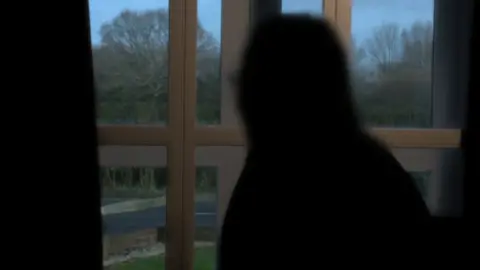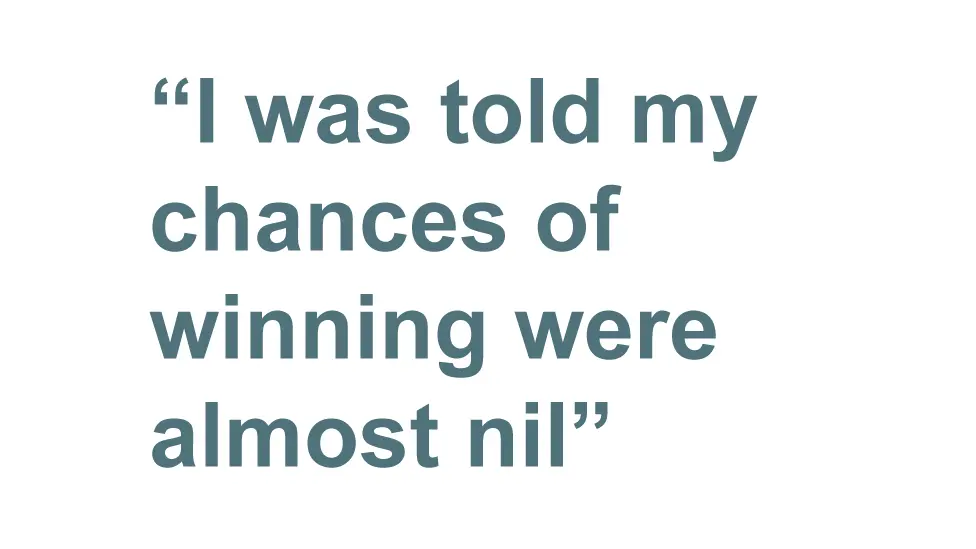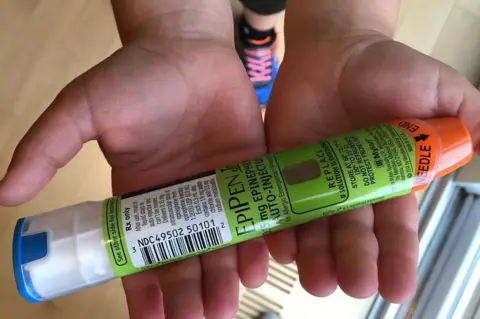The mother who lost her daughter over an EpiPen
 BBC
BBC"Three cars showed up in the early hours of the morning and the police were banging on my door," Anna says.
It was June 2015 when Anna's two-year-old daughter was taken away by social workers from Southampton City Council.
"I didn't know what was going on," she said.
"Then the police said I was being arrested for child neglect."
Anna, not her real name, is originally from Africa and was then a single mother.
Her daughter has allergies and in an incident a few weeks before she was taken away she had been struggling to breathe. Anna called an ambulance and injected the girl with an EpiPen.
It was the second such emergency in seven months.
"It was terrifying with such a little child," she says.
"At the end of the day I had a baby who wasn't breathing, and I had means to help her so I administered it."
But doctors at the hospital said she was wrong to use the EpiPen and suspected she had deliberately made her child ill.
Two days after her daughter had been seized, Southampton Children's Services went to Anna's local family court, in Portsmouth, asking for an interim order allowing them to keep the toddler in their care.
The judge agreed and the little girl was sent to foster parents.
'I felt helpless'
No charges were brought against Anna but social workers were reluctant to return her daughter.
In late 2015, they tried to get the pair to live with other relatives. Then, in 2016 they suggested the girl could live with her father - who had little previous contact with her.
In 2017, when neither solution worked, the local authority decided the little girl - now four - should be adopted.
This also had to go before the family court.
Anna was stunned by the adoption plan.
Her own circumstances had changed. She had married and was more secure than before.
"I was shocked. I just didn't understand. It made me question the family law system or the justice system because what had happened didn't justify for her to be put up for adoption."
She made a counter application to the court: that her daughter come to her new home.
"I felt helpless, completely at somebody else's mercy. I was terrified I would lose my child forever."

The local authority argued Anna presented a "significant risk of physical harm" to her daughter.
They said she could be overprotective, and use medication inappropriately. They also said Anna was not emotionally attuned to her child.
By this point, mother and child had been living apart for nearly two years.
Anna was astonished when Judge Edward Hess approved the local authority's request.
She said she felt "gaslighted" by the system.
Anna, her new husband, and the child's father raided their savings and liquidated assets to fund legal action.
They got permission to go to the Court of Appeal, which lawyers say is unusual.
"I was told my chances of winning were almost nil. But I thought I've got to try to do my best for my daughter."
Once there, they defied the odds and won the case.
£60,000 legal fees
The three judges said the first court's finding was "based on the slimmest of evidence". They overturned the adoption placement order and said the case should be reheard.
But they said Anna would have to pay her own costs.
The relief was "huge", she says, but it was tempered by the knowledge she'd have to find more money.
By now she was pregnant and worried that her new baby could be taken into care unless she won her daughter back.
After the Court of Appeal judgment Southampton City Council stepped up Anna's contact with her daughter.
And last summer she came home to Anna.
"Euphoria. That's all I can say. I was so happy to have her back," she said.
The family has spent £60,000 in legal fees.
 Getty Images
Getty ImagesIn 2017, Southampton had the highest adoption rates in England for children turning five, the BBC discovered in a joint investigation with the Bureau of Investigative Journalism.
When we asked why, the city council said: "All children who were adopted were subject to rigorous scrutiny by the legal system and the family court".
But we wanted to understand the decisions of the local family court.
Although journalists have been allowed into family courts since 2009, what they can report is limited and sometimes unclear. They routinely try to cover cases, especially in local courts.
Senior legal experts have said greater openness in family courts is essential to counter criticism.
However, while some judges treat this call for transparency as routine, others publish hardly anything.
I could find no adoption or care case judgements from Judge Hess in the Portsmouth Family Court, where Southampton cases are heard.
Court of Appeal judgements are published though, which is how we found the case.
When I went to Portsmouth Family Court in October, for Anna's last hearing, another judge made an order that made reporting the story impossible.
He said if we reported the outcome of the case we couldn't include certain details, even though they were in the Court of Appeal judgment.
The freelance journalist Louise Tickle challenged this ruling, and her legal challenge was later joined by the BBC.
The new President of the Family Division, Sir Andrew McFarlane, allowed the appeal which means the case can now be reported.
He also said he is planning new guidance, which could make it clearer for journalists how they can report family courts, and also help guide judges when they order reporting restrictions.
As for Anna, she says she fears other families could be in a similar position.
She thinks legal aid should be reformed so that others can be helped to challenge decisions. She also believes there must be more accountability, through more openness.
"I feel like it really needs to be scrutinised, a bit more open to the public. Because I don't feel like it protects families; it protects bad practice.
"Because basically they're a law unto themselves and nobody is able to challenge them because it's all done in secrecy."
In a statement, Southampton City Council said it was "pleased that the main issue in this appeal has been settled with the agreement of all parties".
"We also welcome the fact that the President of the Family Division intends to consult and give further guidance as to how courts, practitioners and journalists should approach the reporting of private cases involving children and their families," it added.
